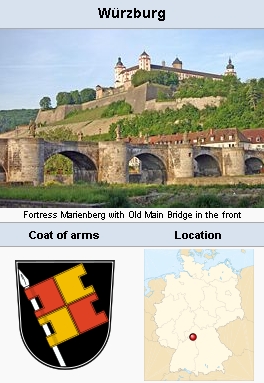Difference between revisions of "Würzburg (Freistaat Bayern, Germany)"
| [checked revision] | [checked revision] |
m |
m (Text replace - "<em>Mennonitisches Lexikon</em>" to "''Mennonitisches Lexikon''") |
||
| Line 4: | Line 4: | ||
<em>Beiträge zur bayrischen Kirchengesch</em> XVI (1910): 170-77. | <em>Beiträge zur bayrischen Kirchengesch</em> XVI (1910): 170-77. | ||
| − | Hege, Christian and Christian Neff. | + | Hege, Christian and Christian Neff. ''Mennonitisches Lexikon'', 4 vols. Frankfurt & Weierhof: Hege; Karlsruhe: Schneider, 1913-1967: v. IV. |
Wiswedel, Wilhelm. <em>Bilder and Führergestalten aus dem Täufertum,</em> 3 vols. Kassel: J.G. Oncken Verlag, 1928-1952: v. I, 131. | Wiswedel, Wilhelm. <em>Bilder and Führergestalten aus dem Täufertum,</em> 3 vols. Kassel: J.G. Oncken Verlag, 1928-1952: v. I, 131. | ||
Latest revision as of 07:36, 16 January 2017

There were many Anabaptists in the bishopric of Würzburg (coordinates: 49.783333, 9.933333 [49° 47′ 0″ N, 9° 56′ 0″ E]) in 1527-1528. Hans Hut and Georg Nespitzer were extremely active here, but the bloodthirsty Bishop Konrad also immediately went into action against them in measures that exceeded any imaginable forms of punishment at the disposal of temporal governments. Duke Wilhelm von Hennenberg, who in spite of the Imperial Edict of 23 April 1529, did not share the attitude of the Würzburg bishop in considering Anabaptism a capital crime but punished the prisoners with more lenient measures, was therefore accused at the Imperial court. This lawsuit lasted beyond the Anabaptist period in the Würzburg area and did not come to a conclusion until about 1540. Bishop Konrad treated all "sectarians" in summary fashion. There is very little to be found in the documents of the former bishopric of Würzburg by way of records of trials, cross-examinations, or statements of imprisoned Anabaptists such as one finds in other places, but a contemporary, Lorenz Fries, reports in his Chronicle that at the beginning of 1528 four men and two women from Ipshoven were brought as prisoners to Würzburg. On 4 February the men were beheaded, the women burned at the stake, and the next day two women, a mother and daughter, were drowned in the Main River. A number recanted; many of these had a hand cut off. Others fled to Moravia, and so it is understandable that the policy of the stake that the bishop applied against the Anabaptists in his country soon cleansed his area of this "sectarianism."
Bibliography
Beiträge zur bayrischen Kirchengesch XVI (1910): 170-77.
Hege, Christian and Christian Neff. Mennonitisches Lexikon, 4 vols. Frankfurt & Weierhof: Hege; Karlsruhe: Schneider, 1913-1967: v. IV.
Wiswedel, Wilhelm. Bilder and Führergestalten aus dem Täufertum, 3 vols. Kassel: J.G. Oncken Verlag, 1928-1952: v. I, 131.
Maps
Map:Würzburg (Freistaat Bayern, Germany)
| Author(s) | Wilhelm Wiswedel |
|---|---|
| Date Published | 1959 |
Cite This Article
MLA style
Wiswedel, Wilhelm. "Würzburg (Freistaat Bayern, Germany)." Global Anabaptist Mennonite Encyclopedia Online. 1959. Web. 19 Jan 2026. https://gameo.org/index.php?title=W%C3%BCrzburg_(Freistaat_Bayern,_Germany)&oldid=146764.
APA style
Wiswedel, Wilhelm. (1959). Würzburg (Freistaat Bayern, Germany). Global Anabaptist Mennonite Encyclopedia Online. Retrieved 19 January 2026, from https://gameo.org/index.php?title=W%C3%BCrzburg_(Freistaat_Bayern,_Germany)&oldid=146764.
Adapted by permission of Herald Press, Harrisonburg, Virginia, from Mennonite Encyclopedia, Vol. 4, pp. 996-997. All rights reserved.
©1996-2026 by the Global Anabaptist Mennonite Encyclopedia Online. All rights reserved.
